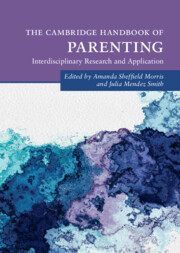Book contents
- The Cambridge Handbook of Parenting
- Cambridge Handbooks in Psychology
- The Cambridge Handbook of Parenting
- Copyright page
- Dedication
- Contents
- Contributors
- Figures
- Tables
- Introduction
- Part I Foundations of Parenting
- Part II Parenting across Development: Social, Emotional, and Cognitive Influences
- Part III Parental Factors That Impact Parenting
- Part IV Child Factors that Impact Parenting
- 17 Parenting Children with Disabilities
- 18 Parenting Children with Externalizing Behavior and ADHD
- 19 Parenting in the Context of Child Anxiety and Depression
- 20 Parenting LGBTQ Children and Adolescents
- 21 Parenting Children with a History of Adversity
- Part V Parent Education, Intervention and Policy
- Index
- References
21 - Parenting Children with a History of Adversity
from Part IV - Child Factors that Impact Parenting
Published online by Cambridge University Press: 01 December 2022
- The Cambridge Handbook of Parenting
- Cambridge Handbooks in Psychology
- The Cambridge Handbook of Parenting
- Copyright page
- Dedication
- Contents
- Contributors
- Figures
- Tables
- Introduction
- Part I Foundations of Parenting
- Part II Parenting across Development: Social, Emotional, and Cognitive Influences
- Part III Parental Factors That Impact Parenting
- Part IV Child Factors that Impact Parenting
- 17 Parenting Children with Disabilities
- 18 Parenting Children with Externalizing Behavior and ADHD
- 19 Parenting in the Context of Child Anxiety and Depression
- 20 Parenting LGBTQ Children and Adolescents
- 21 Parenting Children with a History of Adversity
- Part V Parent Education, Intervention and Policy
- Index
- References
Summary
Adverse childhood experiences (ACEs), including family dysfunction as well as abuse and neglect, have enduring effects on development. Research across diverse populations documents that ACEs are prevalent and cumulative, influencing children’s developing mental, emotional, and physical systems that affect long-term physical and mental health, social relationships, and parenting attitudes and behaviors. Protective and compensatory experiences (PACEs), including nurturing relationships and stable, supportive environments, can mitigate the effects of ACEs, disrupting the intergenerational transmission of adversity. In this chapter, we summarize the effects of ACEs on neurobiological, cognitive, social, and emotional development. Next, we discuss the effects of cumulative protective experiences and the introduce the concept of Balanced Parenting to promote resilience in the face of adversity. We include examples of how parents and other caregivers can effectively parent children with a history of ACEs at different developmental stages, and conclude with a discussion of new directions for research and practice.
Keywords
- Type
- Chapter
- Information
- The Cambridge Handbook of Parenting , pp. 465 - 486Publisher: Cambridge University PressPrint publication year: 2022

